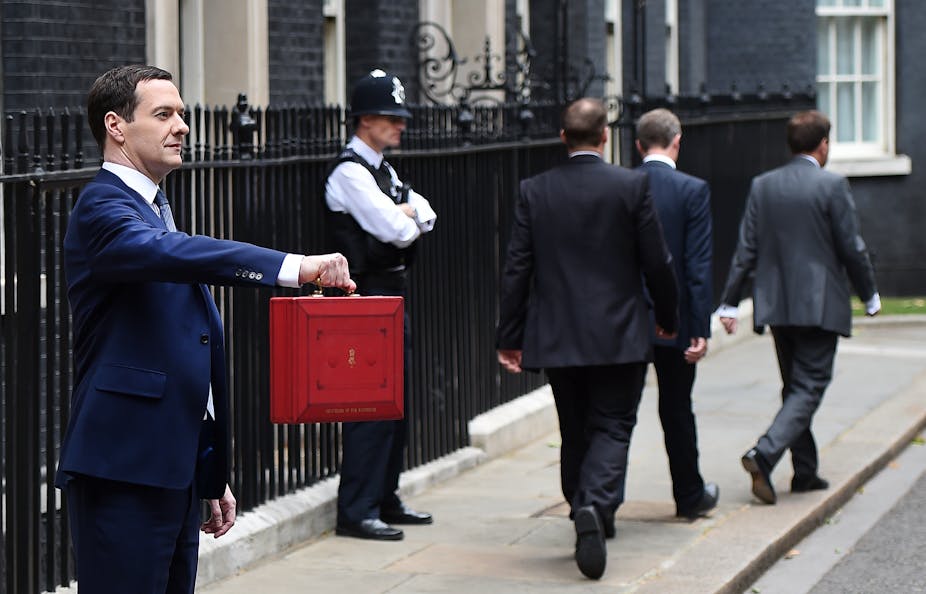George Osborne has unveiled significant cuts to welfare in his first budget for the majority Conservative government.
Detailing plans to cut £12bn from the pot, the chancellor revealed that the benefits cap will be lowered to households earning £20,000 or less and that many working-age benefits will be frozen for four years.
Families will only be able to claim in-work benefits for their first two children and young people will no longer have an automatic right to housing benefit.
Social housing rents will be increased to near market value for households earning £40,000 in London and £30,000 outside.
The government’s programme of public investment cuts is underpinned by a perverse dual logic – that the poor must be punished to encourage them to work, and the rich need as much support as possible in order to create jobs and grow the economy.
These are pillars of the Tories’ economic policy, but evidence is thin on both sides. Since 2007, disposable incomes have fallen, the burden of poverty has shifted toward the young and the gap between rich and poor has widened.
Economic growth forecasts remain weak, with some predicting periods of stagnation or decline until 2017. While the economic impact of these cuts is difficult to predict, the legacy of long-term poverty, deprivation, inequality and indignity this strategy will impart is certain.
Low-income families are being targeted with the benefits cap. To put the £20,000 threshold in perspective, the Joseph Rowntree Foundation suggests a couple with two children needs to earn £40,000 to maintain an acceptable standard of living.

Since benefits make up a substantial percentage of income for poorer households, these cuts are likely to push such families further below the acceptable standard-of-living threshold.
In the absence of real wage growth and a continuing decline in the quality of employment – as evidenced by the widespread use of zero-hours contracts – suitable social protection measures such as benefits are now more necessary than ever.
A fair balance?
Lost in this debate is an assessment of the cost of sustaining the poor relative to the costs of subsidising the rich. Of the total welfare bill, the largest share goes to the Department for Work and Pensions, which receives approximately £167 billion, while the next largest item of direct benefit expenditure is housing benefit at £17 billion. This round of cuts is therefore equal to the annual Disability Living Allowance budget of £12.6 billion, or the cost of child benefit which currently stands at £12.2 billion.
In comparative budgetary terms, these cuts are severe in their scale, amounting to more than two years’ worth of Jobseeker’s Allowance.
Meanwhile, the threshold for paying the higher rate of income tax will be raised to £50,000. Successive cuts to higher rate tax since 1980 have helped the wealthiest 1% of earners grow their share of total income from 9.8%, to a high of 15.4% in 2009.
The threshold for entry into the top 1% in the UK is just under £160,000 – and the increase in the inheritance tax threshold announced in this budget will make it even easier for this group to pass on its privilege to future generations.
Now unrestrained by the Liberal Democrats, pro-rich policies look set to meet little future resistance on the floor of the House of Commons. The perverse dual logic of this strategy of cuts is revealed by the scale of national income lost to corporate welfare, with direct subsidies and grants to the private sector, tax breaks, credit and export insurance, and public procurement costing just under £85 billion per year.
While the announcement of a phased increase in the minimum wage is welcome, it is difficult to see how this will reverse the inequality that will come as a result of this budget without a matching commitment to improving the quality of employment available.
A lesson from Greece
In presenting his budget, Osborne said the situation in Greece should serve as a lesson. And indeed it should, but perhaps not for the reasons he thinks. Greece shows the devastating effects of austerity, and indeed, so does Ireland – the example Europe suggested Greece follow.
The “model results” of Ireland’s austerity strategy include a near-doubling of child poverty rates since 2008, a reduction in direct income support to families and lone parents, and an internship scheme for the unemployed which has amounted to little more than state-subsidised cheap labour for the private sector. Ireland now enjoys the highest unemployment spend, at double the European average, with its various “activation” measures generating few prospects for quality long-term employment.
Osborne’s measures look certain to compound disadvantage across generations, remove vital streams of income and social support from the most vulnerable, while shoring up the prosperity of the wealthy.
Rather than seeing inequality as a social problem though, to a Conservative, inequality is necessary to a healthy, functioning capitalism. While this line of reasoning was consigned to the scrapheap of social theory shortly after World War II, it remains a staple of Tory economic policy.
But Conservative capitalism is not about distributing the fruits of our collective labour equally so this new wave of budget cuts should surprise no-one.

